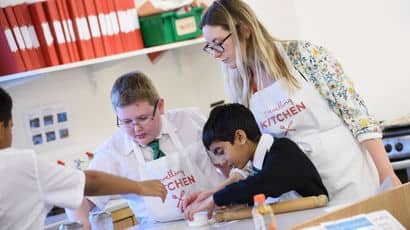Education and Childhood Research Group (ECRG)
The Education and Childhood Research Group (ECRG) encompasses four strands of research: Equity in education; Pedagogy; Childhood, children and young people; and Sustainability in education.
These four Strands are committed to deliver UWE Bristol's values, vision and strategy through real world research and scholarship that seeks to transform futures.
ECRG is made up of researchers, associates and doctoral researchers throughout the School and welcomes active membership and collaboration from across the University. The ECRG is led by Professor Alpesh Maisuria (alpesh.maisuria@uwe.ac.uk), Professor of Education Policy in Critical Education at UWE Bristol.
Details of the activities of the Group are advertised on LindkedIn and our blog posts. Please subscribe to both if you would like to know about our events and how you can be involved.

Research theme and strands
ECRG's research theme and portfolio of projects within our inter-connected research strands.
Postgraduate research
Current and completed postgraduate research activity within ECRG.
Events and activities
Find out about the latest events and activities from ECRG.
Publications
View the latest publications from ECRG members.
Contact us
We welcome enquiries about research within ECRG - please get in touch.
Education blog
-

By Dr Sarah Whitehouse, Programme Leader for the International Doctorate in Education, and Senior Lecturer : Education and Humanities I was reflecting on a keynote lecture delivered by Caroline Daly at the UCET (Universities’ Council for the Education of Teachers) conference in November 2025. In her address, Daly offered a powerful metaphor for the current education … Continue reading "Education, curriculum reform and the canary in the mine"
Education, curriculum reform and the canary in the mine
-

By Dr Verity Jones, Associate Professor in Education The Climate Change Primary Education and Research Network (CCPERN) began 2026 with an energising and thought‑provoking meeting that reaffirmed why this community matters so deeply. Bringing together teachers, researchers, practitioners, and organisations committed to sustainability education, CCPERN continues to offer a vital space for sharing practice, fostering … Continue reading "Building capacity, community, and climate literacy – reflections from the CCPERN January meeting"
Building capacity, community, and climate literacy – reflections from the CCPERN January meeting
-

By Dr Verity Jones, Associate Professor in Education The annual Geography Teacher Educator Conference took place in Manchester this year. At a time when teachers, teacher educators and researchers are navigating curriculum change, intensifying accountability pressures and the urgent challenges of climate and environmental crisis, conferences like this feel more important than ever. They offer … Continue reading "Why geography teacher educator conferences matter: Reflections from Manchester"
Why geography teacher educator conferences matter: Reflections from Manchester
-

By Dr Anish Harrison and Professor Alpesh Maisuria In November 2025, we submitted written evidence to the House of Commons Education Select Committee inquiry into “Reading for Pleasure”. The inquiry comes at a critical time with national data showing that children’s enjoyment of reading is now at its lowest level since records began in 2005 … Continue reading "Reading for pleasure, public libraries, and voices at the margins"
Reading for pleasure, public libraries, and voices at the margins
-

By Dr Claire Osborne, Senior Lecturer in Education The Labour government’s ‘Curriculum and Assessment Review’ (2025) is now out of consultation. As government ministers reflect on the implications for education policy and fulfil their quest to build a “world class curriculum for all”, I want to take a moment to reflect on the future of … Continue reading "A matter of Art in the Primary Curriculum"
A matter of Art in the Primary Curriculum
-

By Dr Verity Jones, Associate Professor in Education On 30 September 2025, Sparks Bristol was filled with energy and optimism as over 100 young changemakers gathered for the Earth Day Heroes Awards Ceremony, hosted by the Global Goals Centre (GGC). From Bristol to Bangladesh, young people came together to celebrate the inspiring work they’ve been … Continue reading "Earth Day Heroes: Youth action, research impact, and the Bristol Uniform Challenge"
Earth Day Heroes: Youth action, research impact, and the Bristol Uniform Challenge
-

By Dr Verity Jones, Associate Professor in Education On 23 September 2025, Lambeth Palace hosted the launch of the Difference in Primary Schools resource—an ambitious and timely initiative that uses children’s film, songs and literature to support meaningful conversations about race, identity, and belonging in primary education. Developed by the Difference programme, the resource is freely … Continue reading "Children’s literature, anti-racism, and educational impact: ‘Difference in Primary Schools’ resource"
Children’s literature, anti-racism, and educational impact: ‘Difference in Primary Schools’ resource
-

By Dr Verity Jones, Associate Professor in Education Report launch This week sees the publication of the Climate Change and Sustainability Education in Additional Learning Needs and Alternative Provision Settings report, authored by Shannon O’Connor, Dr Jennifer Rudd, Dr David Thomas, and Bryony Bromley. Drawing on research from 26 additional learning needs (ALN) settings across Wales … Continue reading "Inclusive climate education: a call to action from additional learning needs and alternative provision settings"
Inclusive climate education: a call to action from additional learning needs and alternative provision settings
Transforming tomorrow, today.
Our unique approach to research, innovation, skills, enterprise and just and ethical practices is driving societal improvements and transforming futures for the better.
RISEResearch Centres and Groups
Browse UWE Bristol's portfolio of research areas, expertise, staff and publications.
Centres and groupsYou may also be interested in

Research in the College of Health, Science and Society
Research centres and institutes in the College of Health, Science and Society at UWE Bristol. Find out what areas of research they focus on and much more.

Research in the School of Education and Childhood
There is strength and diversity in the programme of educational research and evaluation at UWE Bristol. A broad range of substantive areas of enquiry is sponsored by a wide range of funding bodies.
